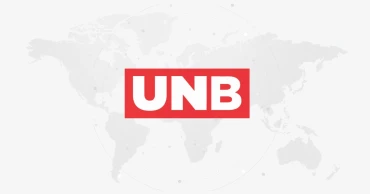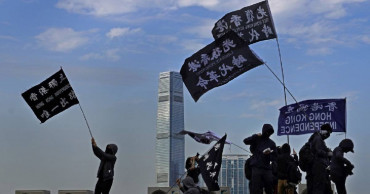pro-democracy movement
Govt desperate to suppress opposition: Fakhrul
BNP Secretary General Mirza Fakhrul Islam Alamgir on Thursday alleged that the government has become "desperate" to suppress the opposition leaders and activists being afraid of the ongoing pro-democracy movement.
“You (AL leaders) used to say a few days back that we didn’t have the ability to stand on the streets and our backs were broken. But now you have become so restive that you are oppressing people by using all might to stop our movement,” he said.
Fakhrul made the remarks while speaking at a press conference at the BNP chairperson’s Gulshan office, condemning the attacks on BNP’s sit-in programme in Faridpur and Mymensingh and some other areas in the country by police and ruling party activists on Wednesday.
Read more: Wake up more to restore voting rights, Fakhrul urges people
He said the government has lost the ground beneath its feet. “The government has become so scared that they are carrying out attacks on our peaceful programmes.”
The BNP leader also said the ruling party leaders are making various unguarded comments about the ongoing movement sensing their fall.
He alleged that the armed ‘cadres’ of the ruling party attacked BNP’s programme in Faridpur and Mymensingh in presence of law enforcers.” The police not only played the role of a silent spectator there but also attacked the leaders and workers of BNP, lobbed teargas shells and charged batons on them.”
The BNP leader claimed that the law enforcers also arrested over 100 BNP leaders and activists from the two divisions while over 250 others were injured during the attacks.
Besides, he said police filed a case against BNP leaders and activists in Faridpur in connection with the clash.
Sought his comments on Awami League general secretary Obaidul Quader’s remark on the outcome of the simultaneous movement with small parties, Fakhrul said people do not care about what the ruling party leader says. “Like me, people all over the country don't give any importance to his remarks.”
Read more: BNP, like-minded parties announce countrywide rally, procession on Jan 16
No programme at district level on January 16:
Fakhrul said their party will hold a rally and procession programme on January 16 in all cities and upazila headquarters to press home their 10-point demand and protest the government’s power price hike decision.
“Yesterday (Wednesday) I said the programme will also be observed in all districts. But the programme will be observed only in all metropolitan cities and upazilas, not in districts.”
3 years ago
BNP starts pro-democracy movement dialogue with political parties
BNP held a meeting with Nagorik Oikya on Tuesday, formally kick-starting a dialogue with other opposition parties aimed at forging unity to launch a greater movement for restoration of democracy.
“We’ve started talks for waging a greater movement to restore democracy and people’s lost rights, including the right to vote,” said BNP Secretary General Mirza Fakhrul Islam Alamgir told reporters after the meeting.
Also read: BNP initiates formal talks with political parties to wage united Movement
The meeting was held at the conference room of the Bangladesh Shishu Kalyan Parishad Building in the city’s Topkhana Road.
He said the lost rights can be restored only by establishing “a true government and parliament of the people after ousting the current fascist regime.”
“People of the country are expecting that the opposition parties will wage a fruitful and effective movement in unison and a change will come through it for establishing a government and parliament of people,” the BNP leader said.
He said they will also talk to other political parties and they hope that they will be able to initiate a joint movement by ending the dialogue quickly. “We hope we can do it very soon.”
Fakhrul said the main points of their discussion today were the restoration of democracy, establishing a polls-time neutral government based on the opinions of the political parties, reconstituting the Election Commission, forming a national government, release of Khaleda Zia and all other opposition leaders arrested in fictitious cases, withdrawal of those cases and stopping repression on opposition leaders and activists.
“We held an effective discussion in a cordial environment. We hope our talks with other parties will also be fruitful and we’ll be able to present a movement programme very soon,” he said.
Fakhrul along with BNP leaders Abdus Salam and Jahiruddin Swapan came to Nagorik Oikya’s office around 5pm and had an one and a half hours of discussion with Mahmudur Rahman Manna and his party’s senior leaders.
Also read: BNP plans protest over Hasina's remark on Khaleda
Nagorik Oikya convener Manna said they discussed the basic issues of waging a movement. “All opposition parties in the country are saying that a fair, good, acceptable election can’t be held under the current government.”
On this basis, he said they will continue a movement until achieving victory for establishing a neutral government to hold a credible national election. “We are considering this meeting as a step towards launching a greater movement.”
Earlier in the day, Fakhrul announced to start the dialogue at a press conference at the party chairperson’s Gulshan office.
The BNP leader said their party’s standing committee took the decision at its virtual meeting on Monday night.
He said they will talk to the political parties and finalise the outline of a united movement through the discussions.
The BNP leader said they will sit with other opposition parties in phases.
Asked whether they will hold a discussion with Jamaat-e-Islami, Fakhrul said they want to talk to every party, including Jamaat.
Replying to another question about the existence of the 20-party alliance, it has not been abolished yet. “We’ll finalise the future course of the alliance through the talks.”
Responding to a question, he said they are not going to call their new political platform an alliance. “The format will be finalised through discussions.”
3 years ago
Anti-coup protests in Sudan amid turmoil after PM resigns
Sudanese took to the streets in the capital, Khartoum, and other cities on Tuesday in anti-coup protests as the country plunged further into turmoil following the resignation of the prime minister earlier this week.
Prime Minister Abdalla Hamdok was ousted in the October coup, only to be reinstated a month later following a deal with the military meant to calm tensions and anti-coup protests. Hamdok stepped down Sunday amid political deadlock, saying he had failed to find a compromise between the ruling generals and the pro-democracy movement.
Sudan has been politically paralyzed since the Oct. 25 coup. The military takeover came more than two years after a popular uprising forced the removal of longtime autocrat Omar al-Bashir and his Islamist government in April 2019.
The military, under international pressure, reinstated Hamdok in November to lead a technocratic Cabinet. But the deal sidelined the pro-democracy movement behind the uprising against al-Bashir. Since then, Hamdok was unable to form a Cabinet amid relentless protests not only against the coup but also against his deal with the military.
Read:Sudan’s PM announces resignation amid political deadlock
Thousands took part in Tuesday marches in Khartoum and its twin city of Omdurman, denouncing the coup. Images posted online show young protesters singing, beating drums and waving Sudanese flags. There were similar demonstrations in other cities, including the eastern city of Port Sudan.
Ahead of the protests, authorities closed major roads and streets in Khartoum and Omdurman, according to activists, tactics that have been employed in the past two months to prevent demonstrators from reaching government buildings.
Since the coup, nearly 60 protesters have been killed and hundreds of others injured in a heavy security crackdown, according to a Sudanese medical group. The protests are called by the Sudanese Professionals' Association and the Resistance Committees, which were the backbone of the uprising against al-Bashir.
Hamdok’s resignation has thrown the country into further uncertainty and “deprived the generals of the fig leaf” they used to continue their military rule, said Mohammed Yousef al-Mustafa, a spokesman for the association
The protest movement insists on a fully civilian government to lead the transition, a demand rejected by the generals who say power will be handed over only to an elected government. Elections are planned in July 2023, in line with a constitutional document governing the transitional period.
U.N. Secretary-General Antonio Guterres called for “meaningful dialogue” between all Sudanese parties to “reach an inclusive, peaceful and lasting solution,” according to U.N. spokesman Stéphane Dujarric.
Sudan’s largest Umma party called for the return to the 2019 constitutional document governing the transitional period, which calls for the military to relinquish the leadership of the ruling sovereign council.
“This is the only way for the salvation of the nation, the integrity of the transitional period and the accomplishment of its tasks within the agreed-upon timeframe,” the party said in a statement.
Read: Sudan's military agrees to reinstate ousted PM
Deliberations have been underway to find “an independent figure” to lead a technocratic Cabinet through elections, according to a military official and a protest leader. They spoke on condition of anonymity to discuss the negotiations. Among names floated was that of former Finance Minister Ibrahim Elbadawi.
Elbadawi, who resigned in 2020, was not immediately available for comment.
Jibril Ibrahim, a rebel leader who joined Hamdok’s government last year following a peace deal with the transitional administration, urged for a “political compromise” to resolve the crisis.
“Let us agree to work together for the sake of Sudan,” tweeted Ibrahim.
Al-Mustafa, the spokesman, said the association rejects talks with the coup leaders, warning of “deadly” street confrontations between protesters and security forces. He called on the international community to pressure the Sudanese military to allow the establishing of a fully civilian government.
Gen. Abdel-Fattah Burhan, head of the ruling Sovereign Council, said an independent Cabinet with “specific tasks” would be formed as the executive branch of the transitional government. The military, he said, would “protect the democratic transition" until Sudan is able to hold free and fair elections.
4 years ago
Hong Kong rally seeks international support for movement
More than a thousand people attended a rally in Hong Kong on Sunday to urge people and governments abroad to support the city's pro-democracy movement and oppose China's ruling Communist Party.
6 years ago





